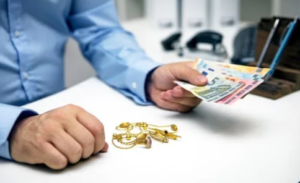Table of Contents
Gold has captivated humanity for centuries, valued for its beauty, rarity, and ability to retain its worth over time. Although it is not used as a currency today, gold has survived against every currency in history, serving as one of the most trustworthy long-term stores of value. Unlike other investments, physical gold is tangible, immune to the elements, easily converted into cash, and can go with you anywhere – making it a point of interest for many seasoned investors.
Whether you’re interested in gold as a long-term investment, a hedge against inflation, or simply as a tangible asset, understanding the process of buying and owning gold is essential. In this comprehensive guide, we delve deeper into the world of gold, exploring the different forms of gold, the factors that influence its value, the steps involved in buying and owning this precious metal, and the potential benefits and risks associated with gold investments – keep reading to discover more!
Understanding The Types of Gold
When people think of gold, typically, the first thing that pops into their minds is jewellery. As one of the most notable precious metals, gold has been used in jewellery-making, coinage, religious artefacts, trade /commerce, and much more for centuries. But gold is available in many different types, from gold IRAs, bars, coins, jewellery, and much more.
Interested investors need to understand the different types of gold to make smart buying decisions, as each state has its own characteristics and considerations. For instance, suppose you’re interested in buying gold bars. In that case, you’ll need to know that they are typically produced by reputable refiners and are valued based on their weight and purity rather than the subjective value of jewellery.
On the other hand, if you’d prefer to deal in gold coins, you will need to know that they can be government-issued or privately minted and often carry additional numismatic value. Or does gold jewellery call to you? Which combines the allure of gold with the artistry of design. Consider your objectives, preferences, and budget when deciding which form of gold is suitable for you.
Factors Influencing Gold Prices

While gold is often considered a safe investment, this is not to say that interested investors should dive headfirst into a world of gold as though they were Walt Disney’s iconic gold-obsessed bird Scrooge McDuck. Like other investments, gold is subject to supply and demand laws which can affect its price, making it a not-so-safe investment after all!
Therefore, if you want to be a knowledgeable, safe gold investor, it is essential that you understand what factors can influence gold prices so that you can make informed buying decisions. To make informed decisions when buying gold, it’s necessary to understand the factors affecting its price. Many factors drive gold prices, such as supply and demand dynamics, global economic conditions, geopolitical events and fluctuations in currency values.
Even though gold is heralded as one of the safest precious metals, it is essential that you keep an eye on these factors as they can provide insights into your gold investment’s timing and potential profitability and protect your money. However, it’s essential to note that gold prices can be volatile and may sometimes move in different directions than other investments.
Researching The Gold Market
Before entering the gold investment, conduct thorough market research to gain a deeper understanding of gold’s current trends and historical performance. Familiarise yourself with gold market terminology, such as spot price, bid-ask spread, and premium. Stay updated on market news and events that could impact gold prices. This knowledge will enable you to make well-informed decisions and seize opportunities. Consider consulting reputable sources, financial advisors, or experts in the field to enhance your understanding of the gold market.
Finding A Reputable Seller
When buying gold, it’s crucial to choose a reputable seller to ensure the authenticity and quality of your purchase. Use the internet to look for established dealers with a solid track record, positive customer reviews, and appropriate certifications. Alternatively, ask your investor friends for the details of gold bullion sellers they’ve used in the past.
Reputable sellers will provide transparent pricing, detailed product information, and secure shipping options. Take the time to research and compare different sellers to find the most reliable one. You can use learning resources from specialists like Physical Gold to learn more, including how to invest in gold and remain completely tax-free.
On their website, they have a variety of how-to guides and informational articles suitable for seasoned and beginner gold bullion buyers speaking out about how you can buy gold etc., as well as a gold buying/selling service for anyone wanting to take their interest in purchasing physical gold to the next level. Visit their website for more, or contact them for specific inquiries today.
Evaluating Gold Authenticity And Purity

Verifying the authenticity and purity of the gold you’re purchasing is essential to safeguard your investment. Gold purity is measured in karats or fineness. Karats indicate the proportion of pure gold in a piece, with 24 karats representing pure gold.
Fineness represents the percentage of gold in a product. Ensure your gold has proper certification or hallmarks to validate its authenticity and purity. Reputable dealers will provide certificates or guarantees of authenticity with their gold products.
Storing Your Gold And Insuring It
Once you own gold, storing it securely and considering insurance options is crucial. Evaluate various storage solutions, such as home safes, safety deposit boxes, or secure vaults. Proper storage minimises the risk of loss, theft, or damage.
Additionally, consider obtaining insurance coverage designed for precious metals to protect your investment from unforeseen events. Insurance can provide peace of mind and financial protection in unfortunate circumstances.
Regular Monitoring And Review
Owning gold is a long-term commitment, and monitoring your investment regularly is essential. Stay informed about market conditions, track the performance of your gold holdings, and review your investment strategy periodically.
Consult with financial experts or advisors to ensure your gold investment aligns with your overall financial goals and risk tolerance. By staying proactive and informed, you can adjust your investment strategy when necessary and capitalise on potential opportunities.
Selling Your Gold

If you have gold jewellery or gold bullion, now is an excellent time to consider selling it, as gold prices are currently near the highest than they’ve been for years. It can be a perfect way to get cash quickly and take advantage of gold prices while they’re high!
However, it is essential that you consider several factors before selling your gold. Consider market conditions, demand, and potential selling options if you ever wish to sell your gold. Explore selling opportunities through reputable dealers, auction houses, or online marketplaces.
Timing your sale strategically can help maximise your returns. Be aware of any applicable taxes or fees associated with selling gold, and consider consulting with professionals or experts to ensure you make informed decisions during the selling process.
Final Thoughts
Buying and owning gold can be a rewarding and potentially profitable endeavour. By understanding the different types of gold, conducting thorough research, choosing reputable sellers, evaluating authenticity and purity, implementing proper storage and insurance measures, monitoring your investment, and strategically selling your gold, you can confidently navigate the world of gold. Remember that investing in gold carries risks, and it’s vital to seek professional advice and make decisions based on your circumstances and financial goals.
Author Profile

- Guest Blogger & Outreach Expert - Interested in Writing Blogs, Articles in Business Niche | News Journalist By Profession in the United Kingdom
Latest entries
 BusinessFebruary 17, 2026Why Online Shops Need a Fulfilment Centre?
BusinessFebruary 17, 2026Why Online Shops Need a Fulfilment Centre? LawJanuary 9, 2026Emily Windsor On The Judgment Calls Barristers Make Daily
LawJanuary 9, 2026Emily Windsor On The Judgment Calls Barristers Make Daily TravelJanuary 7, 2026Key Considerations When Installing Temporary Barriers for Roadworks
TravelJanuary 7, 2026Key Considerations When Installing Temporary Barriers for Roadworks BusinessNovember 21, 2025A Practical Guide to Using LMS Platforms for Better Onboarding
BusinessNovember 21, 2025A Practical Guide to Using LMS Platforms for Better Onboarding





